A Call to Leaders in Education
Association of Directors of Geriatric Academic Programs:
Geriatrics Leadership Scholars Program
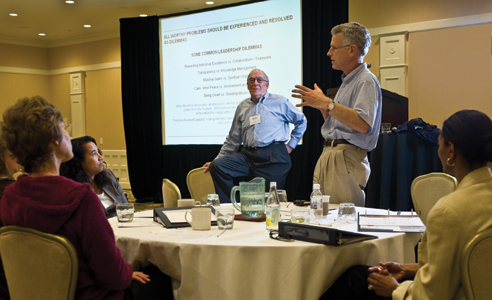 Dr. Seth Landefeld (right) at the 2009 ADGAP Leadership Retreat in the Small Group Problem-Solving session designed to help program directors resolve current issues. The session is led by John O’Neil (center), President of the Center for Leadership Renewal.
To build geriatric leadership at academic health centers, in 2001 the John A. Hartford Foundation provided funding to the Association of Directors of Geriatric Academic Programs (ADGAP) for a training program to increase leadership skills of newly appointed geriatrics program directors. The initiative develops leadership and management skills through intensive formal training, close mentorship, and strong peer support.
Dr. Seth Landefeld (right) at the 2009 ADGAP Leadership Retreat in the Small Group Problem-Solving session designed to help program directors resolve current issues. The session is led by John O’Neil (center), President of the Center for Leadership Renewal.
To build geriatric leadership at academic health centers, in 2001 the John A. Hartford Foundation provided funding to the Association of Directors of Geriatric Academic Programs (ADGAP) for a training program to increase leadership skills of newly appointed geriatrics program directors. The initiative develops leadership and management skills through intensive formal training, close mentorship, and strong peer support.
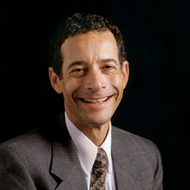
Dr. David Reuben, Director of ADGAP's Leadership Programs
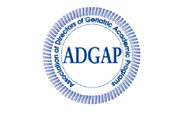
Association of Directors of Geriatric Academic Programs www.americangeriatrics.org/adgap
The success of this program inspired funding for a second scholars program for more senior leaders. The two leadership development programs are led by David B. Reuben, MD, Chief of the Division of Geriatric Medicine and Director of the Multicampus Program in Geriatric Medicine and Gerontology at the University of California, Los Angeles; C. Seth Landefeld, MD, Professor of Medicine and Chief of the Division of Geriatrics at the University of California, San Francisco; and G. Paul Eleazer, MD, Professor of Internal Medicine and Director of the Division of Geriatrics, University of South Carolina, Columbia.
“Investing in geriatrics leadership produces important downstream effects,” says Dr. Reuben. A geriatrics program director with good leadership skills does a better job of recruiting and training health professionals in geriatrics, obtains more funding for research on care of older adults, and ensures that geriatrics receives a fair share of institutional resources.
Each year, four to six academic geriatrics program directors who assumed their positions within the past six years are chosen as Leadership Scholars. In addition, four to six geriatrics directors who have held their position for six years or more and are looking for further career advancement are selected as Senior Leadership Scholars.
Skill-Building for Newly Appointed Program Directors
Physician leaders often find themselves at a disadvantage because a basic grounding in fundamental management concepts, such as operations theory, finances, and negotiations, is not taught in medical school and postgraduate training.Formal training in management is important, but it doesn’t by itself produce effective leaders. According to Dr. Reuben, additional components of leadership development, such as heeding the call, are necessary. “Everyone in a leadership position has talent,” says Dr. Reuben. “It’s a question of developing that talent so they are as effective as they can be.”
To bolster confidence and provide a support structure, two mentors are assigned to each Leadership Scholar. The first mentor is a department chair, dean, or senior official at the scholar’s institution. This mentor offers advice about institutional politics and helps with strategic planning. Having a local mentor demonstrates an investment on the part of the institution in the success of the geriatrics program director. Frequently, this mentorship role alters the relationship between the scholar and her or his supervisor such that the institutional leader becomes the scholar’s advocate. The second mentor is a senior national geriatrics leader, who visits the scholar as well as key personnel who are critical to the success of the program director at her or his home institution. This may include geriatrics faculty members, the department chair, dean, and chiefs of related programs.
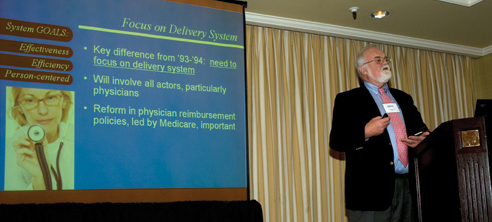
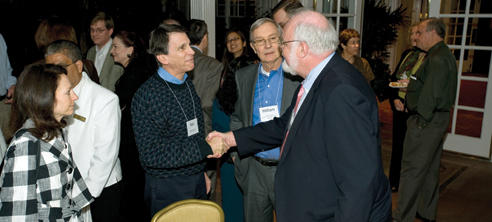 (Top) John Rother, JD, Policy Director at AARP, delivering the keynote on influencing policy at the opening of the 2009 ADGAP Leadership Retreat in San Diego, CA.
(Top) John Rother, JD, Policy Director at AARP, delivering the keynote on influencing policy at the opening of the 2009 ADGAP Leadership Retreat in San Diego, CA.(Bottom) Neil Resnick, MD; William Hall, MD; and John Rother at an ADGAP dinner.
Mindy Fain, MD, Associate Professor of Clinical Medicine and Co-director of the Arizona Center on Aging, University of Arizona College of Medicine, Tucson, found this especially helpful in raising the visibility of geriatrics at her institution. When her national mentor, John R. Burton, MD, Director, Johns Hopkins Geriatric Education Center, Baltimore, Maryland, conducted the annual site visit, he had a meeting with the dean, department heads, and all of the first and second-year medical students, in which he stressed that all physicians need to be prepared to care for older adults. He also had conversations with the dean and department head about a path that an academic health center can take to better meet the needs of an aging population. “Then he placed me front and center to continue,” says Dr. Fain.
Dr. Burton’s continued mentoring of Dr. Fain provided the support and connections that have helped her to position herself as a leader in geriatrics at her institution and on the state level and to obtain education and training grants in geriatrics for the university.
Leadership Scholars also serve as a source of support for each other. Being a program director can be lonely, so it’s important to have other people at your professional level to discuss issues in common. A peer network is also essential for the development of the field of geriatrics.
Leadership Scholars interact with each other and build a community of leaders through bimonthly conference calls and at the two-day annual Geriatrics Leadership Retreat. “The peer networking helped me form a network of colleagues throughout the country whom I can call upon for advice and feedback,” says Laura Mosqueda, MD.
The leadership retreat has three goals. The first is formal leadership training, which may include workshops on financial planning, negotiations, fundraising, and other management issues. The second goal is interpersonal development. Leaders need to understand their own strengths and weaknesses, so they can play to their abilities and surround themselves with people who augment their deficits. One tool used to develop interpersonal skills is the “360 evaluation” in which confidential feedback is provided by superiors, peers, and direct reports. While the feedback is often challenging, it enables participants to see how they are perceived by others and allows for change. The third goal of the retreat is to provide time for peer networking with colleagues. Program directors are encouraged to discuss issues that are challenging to geriatrics in general and to look for areas where they can work together.
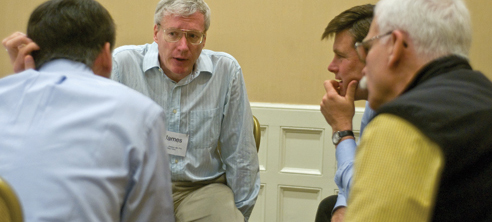
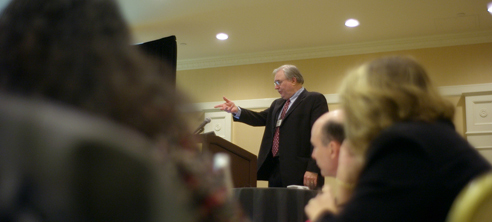 (Top) James Kirkland, MD, PhD, from Mayo Clinic, participating in a small group session with Steven Counsell, MD, and colleagues at the 2009 ADGAP Retreat.
(Top) James Kirkland, MD, PhD, from Mayo Clinic, participating in a small group session with Steven Counsell, MD, and colleagues at the 2009 ADGAP Retreat.(Bottom) Joe Golding, Chairman and CEO of Advancement Resources,giving a workshop titled, “Patients, Family, Geriatrics and Fundraising.”
Preparing Seasoned Leaders for System-Wide Impact
The Senior Leadership Scholars Program is designed to allow experienced division heads—those with six or more years in a leadership position—to develop new opportunities to shape the future of medicine and enhance the health of older adults. The Scholars receive individual coaching to assess their goals and engage in personal strategic planning. This program establishes the networks that foster careers at the highest levels of health care, medical education, science, and policy.From the first cohort of five Senior Leadership Scholars, two have recently pursued new leadership opportunities. Linda Fried, MD, MPH, left her position as Division Chief at Johns Hopkins to become Dean of the Mailman School of Public Health, Columbia University. Marie Bernard, MD, the founding director of the University of Oklahoma’s Department of Geriatric Medicine, was appointed Deputy Director of the National Institute on Aging in October 2008. Both credit their experience in the Leadership Scholars Program with helping to propel their careers to the next level.
Lessons Learned
“Over the past eight years, we have learned that formal training programs are only the start of leadership training in geriatrics,” says Dr. Reuben. The formal courses that the newly appointed directors participate in and the leadership development sessions at the retreat provide some basic tools and open the program directors to the possibilities for further development. Much of the subsequent growth can be attributed to learning from their formal mentors (local and national) and peer network (the other program directors who are facing similar issues in their work).Geriatrics program directors have been remarkably generous in sharing their time and experience with their colleagues. “Watching the one-on-one and small group sessions at the retreat has been inspirational and a far cry from some of the competitiveness that often characterizes academic medicine,” says Dr. Reuben. “It’s wonderful to see a community helping each other so that all boats (i.e., geriatric academic programs) can rise.”
Outcomes
“As a result of the ADGAP leadership work, program directors find that they are more effective as leaders and are able to bring more resources not only to their own institutions, but to the field of geriatrics as well,” says Dr. Reuben. The outcomes of the leadership training have been amazing. “Some Leadership Scholars have taken fledgling or struggling programs and made them solid programs at their institutions,” says Dr. Reuben. “Some have brought new resources to their programs and have taken leadership of professional societies, and some have moved on to more advanced leadership positions.”Eight scholars led successful applications for Donald W. Reynolds Foundation grants to increase geriatrics training in medical school curricula, bringing $2 million in outside funding to each of their respective schools. Two Scholars led their institutions to become Hartford Centers of Excellence in Geriatric Medicine and Training. Scholars have also brokered favorable revisions to the Accreditation Council for Graduate Medical Education fellowship program requirements.
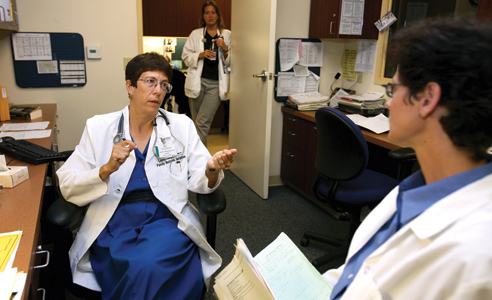 Dr. Laura Mosqueda, seated with Dr. Lisa Gibbs, right, are members of a team that investigates cases of abuse and neglect among the elderly. Photo: Monica Almeida/The New York Times/Redux.
Dr. Laura Mosqueda, seated with Dr. Lisa Gibbs, right, are members of a team that investigates cases of abuse and neglect among the elderly. Photo: Monica Almeida/The New York Times/Redux.
Partnerships with Other Programs
The ADGAP Geriatrics Leadership Scholars Program, like all Hartford-funded projects, seeks to efficiently utilize existing resources and to capitalize upon the success of proven leadership programs. As part of their experience, ADGAP Scholars are awarded a stipend to attend a short-term leadership training program for physicians at an established institution or business school. Scholars often elect to participate in Harvard’s Leadership Development for Physicians program. This program brings together physicians and an inter-disciplinary faculty for two weeks of intensive and systematic study of critical leadership and management issues that face physicians in administrative positions of academic health centers. This and other renowned leadership programs, such as the one at the University of Pennsylvania Wharton School of Business Center for Leadership and Change Management, provide state-of-the-art training in leadership and augment what is learned through the ADGAP program.Next: Profile in Leadership
Accepting the Challenge to Expand Geriatrics
Mark A. Supiano, MD ›
